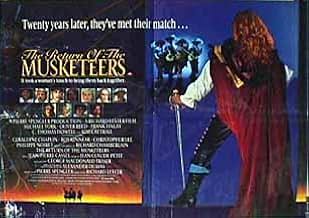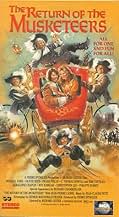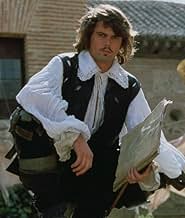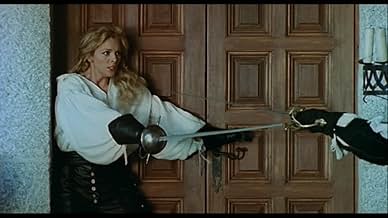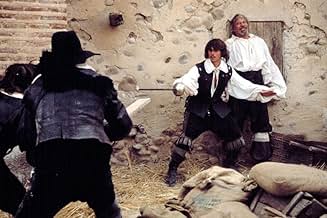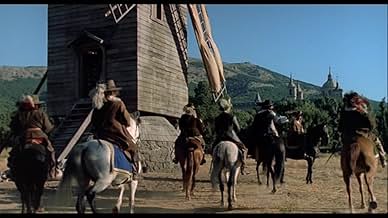AVALIAÇÃO DA IMDb
5,9/10
4,1 mil
SUA AVALIAÇÃO
Adicionar um enredo no seu idiomaIn France in 1649, the services of the Four Musketeers are needed again, and they run into some old foes from twenty years before.In France in 1649, the services of the Four Musketeers are needed again, and they run into some old foes from twenty years before.In France in 1649, the services of the Four Musketeers are needed again, and they run into some old foes from twenty years before.
- Direção
- Roteiristas
- Artistas
Eusebio Lázaro
- Duke of Beaufort
- (as Eusebio Lazaro)
Jean-Pierre Cassel
- Cyrano de Bergerac
- (as Jean Pierre Cassel)
- Direção
- Roteiristas
- Elenco e equipe completos
- Produção, bilheteria e muito mais no IMDbPro
Avaliações em destaque
Lester's musketeer films were some of the first films I ever saw in the movie theatre, and I was entranced. Disappointingly I also saw "The Fifth Musketeer" with a different set of actors, and a different production team. Fast forward ten to fifteen years after that, and I'm channel surfing one evening when I come across some kind of period piece that happens to looks like a musketeer film on WTBS.
And it is. Complete with Michael York and gang to reprise their roles.
Huh? Wha-? "Return of the Musketeers"? How is it that I never heard of this movie? Particularly when it came out a few years before airing on Ted Turner's Superstation?
Unfortunately I only caught the final twenty minutes or so, but I knew WTBS would reair it at some point, or it'd be available on VHS somewhere. Right?
Nope.
Just like the book upon which the film was based I had to wait twenty years to get a DVD of this film, and from where? France. Fitting, if somewhat ironic given the production team. As part of a three film set I had to repurchase the original 1970's films, but at least I finally have the full set of Richard Lester's renaissance tales.
But, to the film. I like it. It's not quite as extraordinary as the first two films, but it does manage to recapture some of the atmosphere set by the previous two films. We see the decadence of the privileged aristocracy, but we don't quite see the visual juxtaposition of what was filth ridden Europe at that point in history.
I have to admit that the film feels somewhat cobbled together, but I enjoyed it all the same. As you probably already know comedic actor Roy Kinnear's life was tragically cut short working on this production, and the film is appropriately dedicated to him.
I guess the one thing that really stands out in this film is the fact that it's a relatively low budget affair. When the first musketeer films were shot the film makers had the advantage of shooting under Franco's Spain, making the production a cheap affair for en epic scale production. I guess when democracy spreads the wealth it also spreads the demand for wealth, making things more expensive, therefore reducing the scale of the action and truncating any large battle scenes. You can tell that in spite of this being an expensive production that the money just wasn't there to do proper Richard Lester justice for this third installment of the musketeer movies.
All in all I enjoyed it. As I say the production values aren't quite there. Noticeably the one real critique that I had with the second film "The Four Musketeers" was the fact that Michael Legrand's adventurous score was absent. So it is with this film. Which is a shame, because an adventurous film needs an adventurous score. Oh well.
Like I say, it's not the best film in the series, but I'm glad to finally have it in my collection, albeit on Region 2 DVD. Give it a chance if you're new. If you remember the 70's musketeer films, then give this one a spin for a small bit of remembrance.
And it is. Complete with Michael York and gang to reprise their roles.
Huh? Wha-? "Return of the Musketeers"? How is it that I never heard of this movie? Particularly when it came out a few years before airing on Ted Turner's Superstation?
Unfortunately I only caught the final twenty minutes or so, but I knew WTBS would reair it at some point, or it'd be available on VHS somewhere. Right?
Nope.
Just like the book upon which the film was based I had to wait twenty years to get a DVD of this film, and from where? France. Fitting, if somewhat ironic given the production team. As part of a three film set I had to repurchase the original 1970's films, but at least I finally have the full set of Richard Lester's renaissance tales.
But, to the film. I like it. It's not quite as extraordinary as the first two films, but it does manage to recapture some of the atmosphere set by the previous two films. We see the decadence of the privileged aristocracy, but we don't quite see the visual juxtaposition of what was filth ridden Europe at that point in history.
I have to admit that the film feels somewhat cobbled together, but I enjoyed it all the same. As you probably already know comedic actor Roy Kinnear's life was tragically cut short working on this production, and the film is appropriately dedicated to him.
I guess the one thing that really stands out in this film is the fact that it's a relatively low budget affair. When the first musketeer films were shot the film makers had the advantage of shooting under Franco's Spain, making the production a cheap affair for en epic scale production. I guess when democracy spreads the wealth it also spreads the demand for wealth, making things more expensive, therefore reducing the scale of the action and truncating any large battle scenes. You can tell that in spite of this being an expensive production that the money just wasn't there to do proper Richard Lester justice for this third installment of the musketeer movies.
All in all I enjoyed it. As I say the production values aren't quite there. Noticeably the one real critique that I had with the second film "The Four Musketeers" was the fact that Michael Legrand's adventurous score was absent. So it is with this film. Which is a shame, because an adventurous film needs an adventurous score. Oh well.
Like I say, it's not the best film in the series, but I'm glad to finally have it in my collection, albeit on Region 2 DVD. Give it a chance if you're new. If you remember the 70's musketeer films, then give this one a spin for a small bit of remembrance.
Richard Lester attempts to recreate the magic of his '70s "Musketeer" films, and for the most part he succeeds, but "The Return of the Musketeers" is a bit too episodic at times and occasionally feels rushed, particularly at the end. It's fun to see the foursome back together again, though, and Jean-Pierre Cassel (who played Louis XIII in the earlier films) has a nice turn as a delusional Cyrano de Bergerac. Too bad this turned out to be Lester's last film (not counting the Paul McCartney concert film "Get Back").
A great hoax circulates about this movie. Unfortunately, we are at a time when there are no principles and the websites copy here and there, without more, without citing provenance, including the supposedly serious ones. And so repeated ends up looking true.
On September 18, 1988, during the filming in Toledo, at the great Puente de Alcántara, the actor Roy Kinnear fell from his saddle. He was taken to the hospital in Toledo and was diagnosed with a partial pelvic fracture. Not having a serious prognosis, he was transferred that afternoon to the Ruber clinic in Madrid. The next day, when he was hospitalized, he had a heart attack and died.
It is said that Richard Chamberlain, angered by the event, left the shooting. This rumor was fueled by the fact of his brief role in the film. Well, ... IT IS COMPLETELY FALSE. Chamberlain had gladly accepted to participate in the film, but on condition that his already signed commitments were respected. It was filming a few days, until Friday, September 3 in San Lorenzo de El Escorial (nearby Madrid). On September 4, 15 days before the unfortunate event, he set course for Los Angeles. This is reflected in the chronicle of diary La Vanguardia of September 4, 1988.
The third installment in the Lester saga ,the fourth ("Le Vicomte De BRagelonne" feat. the iron mask) was never filmed ,because this one was not very commercially successful.
Roughly based on "Vingt Ans Après" ,"the return" was made sixteen years later ,with the same actors (Faye Dunaway ,Raquel Welch and Charlton Heston are not present ,their characters being all dead).Also Louis the Thirteenth is dead,Jean-Pierre Cassel who played his role,returns as Cyrano De Bergerac who comes at the most awkward moment.
The historical background is thin,although dealing with "La Fronde" ,a noble rebellion,and Mazarin's struggle to maintain the absolute monarchy ;and in spite of the musketeers,he was successful ,for the Sun King's reign only began with his death in 1661 ,when he was already 23.
Unlike in the book,it's a daughter (Justine De Winter) and not a son who wants to avenge her mother Milady.It's first surprising but becomes repetitive in the long run.It lacks some imagination:why not an affair with Raoul for instance?
The first movie of the saga remains the most successful:in this one,time has taken its toll,and what could have been another magnificent "Robin and Marion" ,a journey through the past tinged with nostalgia ,remains here a moderately entertaining swashbuckler.
Roughly based on "Vingt Ans Après" ,"the return" was made sixteen years later ,with the same actors (Faye Dunaway ,Raquel Welch and Charlton Heston are not present ,their characters being all dead).Also Louis the Thirteenth is dead,Jean-Pierre Cassel who played his role,returns as Cyrano De Bergerac who comes at the most awkward moment.
The historical background is thin,although dealing with "La Fronde" ,a noble rebellion,and Mazarin's struggle to maintain the absolute monarchy ;and in spite of the musketeers,he was successful ,for the Sun King's reign only began with his death in 1661 ,when he was already 23.
Unlike in the book,it's a daughter (Justine De Winter) and not a son who wants to avenge her mother Milady.It's first surprising but becomes repetitive in the long run.It lacks some imagination:why not an affair with Raoul for instance?
The first movie of the saga remains the most successful:in this one,time has taken its toll,and what could have been another magnificent "Robin and Marion" ,a journey through the past tinged with nostalgia ,remains here a moderately entertaining swashbuckler.
To be honest, though I have not watched them in ages, I am not quite as much a fan of Richard Lester's revisionist version(s) of Alexandre Dumas' swashbuckling saga as I would like (being more partial to the 1948 version which is the one I grew up with); with this in mind, I did not actively seek out to catch up with the belated third entry, neither when it opened in local theaters nor on its sporadic Italian TV appearances! That said, having purchased Anchor Bay's SE DVD set of the 1973/4 adaptations regardless, I also made it a point to finally acquire the film under review
and, though I have been wanting to check it out for the longest time, only got to it now jointly in tribute to James Whale (by way of his definitive 1939 version of THE MAN IN THE IRON MASK) and as part of my current Easter epic marathon!
To cut a long story short, I quite enjoyed the film (though the comedy is still very much frenzied and hit-and-miss in the traditional Lester style) – which had been thoroughly ignored at the time, another reason I was in no special hurry to watch it. Of course, Lester re-acquired the services of most of the principals save, obviously, for the ones who had expired or been replaced (Faye Dunaway and Charlton Heston respectively: amusingly, when the latter wished there was some way to bring Cardinal Richelieu back, the director obliged by having a portrait of him in character hung up in his replacement Mazarin's office throughout the film and which he later donated to the actor!). Still, Jean-Pierre Cassel exchanges roles from the French royal to that of nasally-deformed poet/buffoon Cyrano De Bergerac; incidentally, he had previously 'met' this other popular literary figure – reincarnated by Jose' Ferrer after his 1950 Oscar win! – when himself playing the Musketeer D'Artagnan in an obscure but worthwhile 1963 film by Abel Gance!
The new recruits, however, also proved surprisingly effective: Philip Noiret as Cardinal Mazarin, Prime Minister and Regent in lieu of the child King Louis XIV (though his openly carrying on a relationship with Geraldine Chaplin's Queen Mother is rather in poor taste!); C. Thomas Howell as the adopted son of Oliver Reed's Athos (the sole link to Dumas' "Le Vicomte De Bragellone" aka "The Man In The Iron Mask" – whereas the rest is an adaptation of "Twenty Years After", already solidly brought to the screen in 1952 as AT SWORD'S POINT); and Kim Cattrall as the true villainess of the piece (inevitably, we had to have one here as well), memorably introduced as an axe-wielding monk(!) catching up with the executioner who had beheaded her mother, Milady De Winter – born out of the latter's relationship with Rochefort (played once again by Christopher Lee, despite his vociferous protests over the years of having been paid for the previous outings on a two-films-for-the-price-of-one basis!) and whom she detests and humiliates for having abandoned her.
The plot finds Michael York's D'Artagnan still struggling for a court position, Oliver Reed's Athos typically raising hell under the influence (as befits the actor who passed away in Malta 10 years later during the filming of GLADIATOR {2000} following yet another massive binge in a local bar that was subsequently renamed "Ollie's Pub"!!) – however, whenever he chooses to flex his serious acting muscles, he is as commanding as any thespian, Frank Finlay as an inertly-wealthy Porthos, while Richard Chamberlain's Aramis is now confessor to Chaplin and, though relegated to a "Special Appearance" credit, he does get a reasonably meaty role as a womanizing cleric! Also on hand is Roy Kinnear as an amiably impish Planchet: unfortunately, he would himself die when thrown off a horse while shooting this, an unfortunate accident which led the director to give up film-making altogether (without wishing to pass judgment on him, this decision is in stark contrast to John Landis' essentially unruffled reaction at the even more tragic death of Vic Morrow while TWILIGHT ZONE: THE MOVIE {1983} was being made!).
Anyway, the narrative here incorporates the taking of power from British King Charles I (Chaplin's character's brother) by Oliver Cromwell – in cahoots with Mazarin and Justine De Winter! The Queen Mother dispatches the Musketeers to save him, but they hilariously fail since, having kidnapped the executioner and hiding under the gallows ostensibly to strike at the opportune moment, Cattrall deals the deadly blow herself unheralded! Earlier, the quartet of swordsmen also had found their loyalties divided when D'Artagnan and Porthos opt to serve the Cardinal, while Athos and Aramis take the side of a rather fey Duke (while escaping the unaccountably bumbling Rochefort's clutches – the latter even expires comically in an explosion aboard ship!) which an opposing faction supports. The swordplay is reasonably vigorous (despite the Musketeers showing their age), with Justine often taking them – and Howell – on all at once; her athletic exit, then, rips off Rupert Of Hentzau's from "The Prisoner Of Zenda"! In the end, the film (that, watched on a 40" screen, occasionally exhibited smudgy visuals) essentially marks the transition between the classical era of adventure films to the youth-oriented pictures prevalent today.
To cut a long story short, I quite enjoyed the film (though the comedy is still very much frenzied and hit-and-miss in the traditional Lester style) – which had been thoroughly ignored at the time, another reason I was in no special hurry to watch it. Of course, Lester re-acquired the services of most of the principals save, obviously, for the ones who had expired or been replaced (Faye Dunaway and Charlton Heston respectively: amusingly, when the latter wished there was some way to bring Cardinal Richelieu back, the director obliged by having a portrait of him in character hung up in his replacement Mazarin's office throughout the film and which he later donated to the actor!). Still, Jean-Pierre Cassel exchanges roles from the French royal to that of nasally-deformed poet/buffoon Cyrano De Bergerac; incidentally, he had previously 'met' this other popular literary figure – reincarnated by Jose' Ferrer after his 1950 Oscar win! – when himself playing the Musketeer D'Artagnan in an obscure but worthwhile 1963 film by Abel Gance!
The new recruits, however, also proved surprisingly effective: Philip Noiret as Cardinal Mazarin, Prime Minister and Regent in lieu of the child King Louis XIV (though his openly carrying on a relationship with Geraldine Chaplin's Queen Mother is rather in poor taste!); C. Thomas Howell as the adopted son of Oliver Reed's Athos (the sole link to Dumas' "Le Vicomte De Bragellone" aka "The Man In The Iron Mask" – whereas the rest is an adaptation of "Twenty Years After", already solidly brought to the screen in 1952 as AT SWORD'S POINT); and Kim Cattrall as the true villainess of the piece (inevitably, we had to have one here as well), memorably introduced as an axe-wielding monk(!) catching up with the executioner who had beheaded her mother, Milady De Winter – born out of the latter's relationship with Rochefort (played once again by Christopher Lee, despite his vociferous protests over the years of having been paid for the previous outings on a two-films-for-the-price-of-one basis!) and whom she detests and humiliates for having abandoned her.
The plot finds Michael York's D'Artagnan still struggling for a court position, Oliver Reed's Athos typically raising hell under the influence (as befits the actor who passed away in Malta 10 years later during the filming of GLADIATOR {2000} following yet another massive binge in a local bar that was subsequently renamed "Ollie's Pub"!!) – however, whenever he chooses to flex his serious acting muscles, he is as commanding as any thespian, Frank Finlay as an inertly-wealthy Porthos, while Richard Chamberlain's Aramis is now confessor to Chaplin and, though relegated to a "Special Appearance" credit, he does get a reasonably meaty role as a womanizing cleric! Also on hand is Roy Kinnear as an amiably impish Planchet: unfortunately, he would himself die when thrown off a horse while shooting this, an unfortunate accident which led the director to give up film-making altogether (without wishing to pass judgment on him, this decision is in stark contrast to John Landis' essentially unruffled reaction at the even more tragic death of Vic Morrow while TWILIGHT ZONE: THE MOVIE {1983} was being made!).
Anyway, the narrative here incorporates the taking of power from British King Charles I (Chaplin's character's brother) by Oliver Cromwell – in cahoots with Mazarin and Justine De Winter! The Queen Mother dispatches the Musketeers to save him, but they hilariously fail since, having kidnapped the executioner and hiding under the gallows ostensibly to strike at the opportune moment, Cattrall deals the deadly blow herself unheralded! Earlier, the quartet of swordsmen also had found their loyalties divided when D'Artagnan and Porthos opt to serve the Cardinal, while Athos and Aramis take the side of a rather fey Duke (while escaping the unaccountably bumbling Rochefort's clutches – the latter even expires comically in an explosion aboard ship!) which an opposing faction supports. The swordplay is reasonably vigorous (despite the Musketeers showing their age), with Justine often taking them – and Howell – on all at once; her athletic exit, then, rips off Rupert Of Hentzau's from "The Prisoner Of Zenda"! In the end, the film (that, watched on a 40" screen, occasionally exhibited smudgy visuals) essentially marks the transition between the classical era of adventure films to the youth-oriented pictures prevalent today.
Você sabia?
- CuriosidadesOn September 19, 1988, during filming in Toledo, Spain, Roy Kinnear fell from his horse, sustaining a broken pelvis. He died from a heart attack the next day at a Madrid hospital. Before the accident happened, Kinnear had constantly protested against riding the horse, because he had no experience in it. He also requested a stunt double, as he also had serious safety concerns. But since they didn't have a stunt double for his part, he was forced to ride the horse, which then led to the accident shortly afterwards. Kinnear's widow, subsequently sued the producers for negligence and wrongful death, winning significant damages and compensation.
- Erros de gravaçãoCromwell is portrayed as leader of the Parliamentarian ('Roundhead') Army and de facto ruler after Charles I's execution. In 1649, however, he was still only second-in-command of the Army (he would not become commander-in-chief until well over a year later, following Sir Thomas Fairfax's resignation). William Lenthall, as Speaker of the House of Commons, was the nearest thing the new English Republic had to a Head of State until Oliver Cromwell took up the reigns of power as Lord Protector in 1653.
- Citações
Cardinal Mazarin: The people of England will permit anything - except cruelty to horses and a rise in the price of beer.
- Versões alternativasThe (2009) French DVD edition differs from the earlier UK VHS (and cinema) version. Both Philip Noiret and Jean Pierre Cassel had their voices re-dubbed in the VHS version, but here - on the English language option - their own voices are heard in English. Also several scenes are cut including the scene where D'Artangan gets his assignment from Mazarin to look up his old friends The Three Musketeers and the later scene where King Charles I is playing golf while being arrested by Oliver Cromwell's forces (likewise Michael York's narration of these scenes have been omitted).
- ConexõesFollowed by La Femme Musketeer (2004)
Principais escolhas
Faça login para avaliar e ver a lista de recomendações personalizadas
- How long is The Return of the Musketeers?Fornecido pela Alexa
Detalhes
- Data de lançamento
- Países de origem
- Idiomas
- Também conhecido como
- The Return of the Musketeers
- Locações de filme
- Empresas de produção
- Consulte mais créditos da empresa na IMDbPro
- Tempo de duração1 hora 42 minutos
- Cor
- Mixagem de som
- Proporção
- 1.85 : 1
Contribua para esta página
Sugerir uma alteração ou adicionar conteúdo ausente

Principal brecha
By what name was A Volta dos Mosqueteiros (1989) officially released in India in English?
Responda

